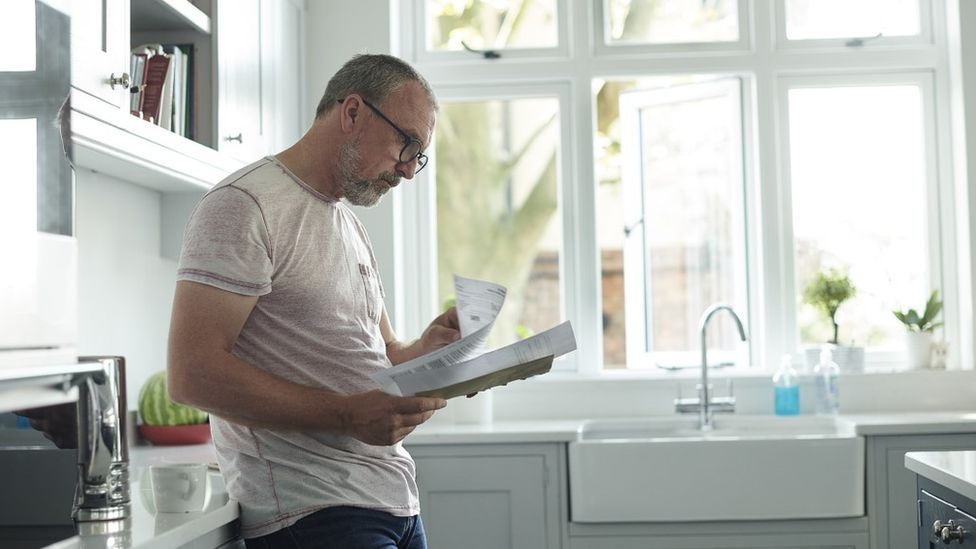
Energy bills are set to go up for 15 million households in England, Wales and Scotland.
It's because the energy price cap - the maximum price suppliers can charge customers on a standard tariff - is rising.
Will my bill increase when the cap is raised?
If you are on a standard tariff or prepayment meter, then the answer is yes.
The energy price cap will rise from the start of October.
Those on standard tariffs could see an increase of £139, from £1,138 to £1,277, regulator Ofgem has announced.
Prepayment customers could see an increase of £153, from £1,156 to £1,309.
Your supplier can increase your bills up to the maximum allowed by the cap.
If you are on a fixed tariff you will not be affected - but keep an eye on when your deal ends.
Can I find a cheaper deal?
The good news is that you have two months to do something about it.
You can investigate cheaper deals, either with your own supplier or by moving to a rival.
Switching to a lower-priced fixed deal can save you hundreds of pounds.
11 millionUK households on standard tariff
4 millionhouseholds on prepayment meters
13 million households on fixed rate tariffs
All suppliers have these, so the simplest way to save is to contact your existing supplier and ask to be moved to its lowest-priced fixed deal.
However, you could probably save more by switching to a rival.
Jonathan Brearley, chief executive of Ofgem, said people "can reduce their energy bills further by shopping around for a better deal".
Is it easy to switch my supplier?
It's simple to switch using an energy comparison site - all you'll need is your postcode, the name of your current supplier, and the name of your current tariff.
Citizens Advice has a useful guide to choosing the right tariff
Ofgem also sets out the steps you should take to switch energy supplier and shop for a better deal.
What is the energy price cap?
The energy cap is the maximum price suppliers can charge customers on a standard - or default - tariff.
This is the deal you'll get if you don't sign up to a fixed rate tariff when you join a supplier.
You'll also end up on a standard tariff if your fixed rate ends and you don't switch to a new deal.
Standard tariffs are variable, which means energy companies can increase - or decrease - the rate they charge you at any time.
However, the energy price cap limits the amount your supplier can charge you.

Why was the energy price cap introduced?
It was introduced by Ofgem in 2019 to help consumers struggling with the increasing costs of heating and powering their homes.
Before its introduction, energy users who stayed with the same supplier on a standard variable tariff were at the mercy of suppliers who could set prices as high as they wanted. They were often accused of not passing on lower prices.
It left many millions of customers paying up to £300 more a year than people who had switched to a cheaper supplier or fixed tariff.
How is the cap worked out?
The price cap is based on the number of gas and electricity units a typical customer uses.
The unit measure, from which your energy bill is calculated and which you may see on your bills, is a kilowatt-hour (kWh).
The headline price cap figure is based on a typical user - which is 3,100 kWh of electricity and 12,000 kWh of gas in a year, according to Ofgem.
Your annual energy bill could be higher or lower than the typical charge depending on the size of your property and how much energy you use.
Every February and August, Ofgem announces the new level of the price cap based on the latest estimated costs of supplying energy.
It takes into account the wholesale price of gas and electricity - which is what suppliers have to pay for the energy. This accounts for about 40% of your bill.
When wholesale energy prices fell last summer following the first lockdown, Ofgem reduced the level of the cap by £84 for last winter.
But in February it increased the cap by £96, blaming rising wholesale costs.
Since then the wholesale cost of energy has climbed by more than 50%, which accounts for the latest increase.
https://news.google.com/__i/rss/rd/articles/CBMiLGh0dHBzOi8vd3d3LmJiYy5jby51ay9uZXdzL2J1c2luZXNzLTU4MDkwNTMz0gEwaHR0cHM6Ly93d3cuYmJjLmNvLnVrL25ld3MvYnVzaW5lc3MtNTgwOTA1MzMuYW1w?oc=5
2021-08-06 08:16:58Z
52781778894527
Tidak ada komentar:
Posting Komentar